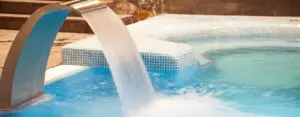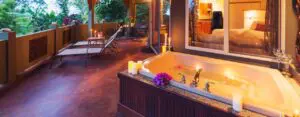February 27, 2020
Category: Hot Tub
The word “chemicals” may not seem to be synonymous with health and wellness. However, a hot tub that hasn’t been properly treated can be a very dangerous place for the human body. Even if you’re looking for the most natural possible experience with your hot tub it will still be important to ensure that you have the right mix of chemicals in there to keep you safe. As with everything, it’s always possible to strike a balance that works for you.
A hot tub without chemicals – what are the risks?
The average hot tub is usually kept at a temperature of around 25-40°C – this creates optimum conditions for fungi and bacteria to thrive, both of which can be highly detrimental for humans. If you decided to use your hot tub without any chemicals at all the water would soon become green and there could be a whole range of unfortunate – and dangerous – health consequences.
A hot tub sanitiser is essential
Chlorine is the most popular option for hot tubs and there is a very good reason for this – it’s a cheap and effective way to sanitise your hot tub and make sure that the water in it is safe for you, your friends, family and guests to use. It’s also an incredibly fast acting sanitiser so it will start working very quickly and provide protection almost straight away. However, not everyone likes using chlorine. You may be allergic to this chemical or you may have had a bad experience in the past – if so there are other options. It’s worth noting that if you feel like you’ve had problems with chlorine elsewhere, for example at a public pool, this may not necessarily be the chlorine itself but could be another issues, such as a PH imbalance or too little chlorine in the water leading to a bacterial infection.
What are the alternatives to chlorine?
If you’re really not keen on chlorine in your hot tub there are two main alternatives:
- Bromine. This chemical comes from the same family as chlorine but tends to be a little softer on the skin and isn’t quite as fast acting. Although Bromine is usually more expensive than chlorine it will regenerate every time the water is shocked so you may need less of it. Bromine is also very effective in hotter water, which is ideal for a hot tub.
- Salt. If you’re looking for a more natural option, salt systems are a great choice. These use sodium chloride in the water to create chlorine to sanitise it.
Every hot tub requires some kind of system in place to ensure that the water is clean and you are protected from bacteria and fungi. However, there is no need to use harsh chemicals in your hot tub and with the right approach you can keep the use of chemicals to a minimum. The key is to ensure that you have just enough to provide sanitising protection for you and everyone you plan to share the hot tub with.


